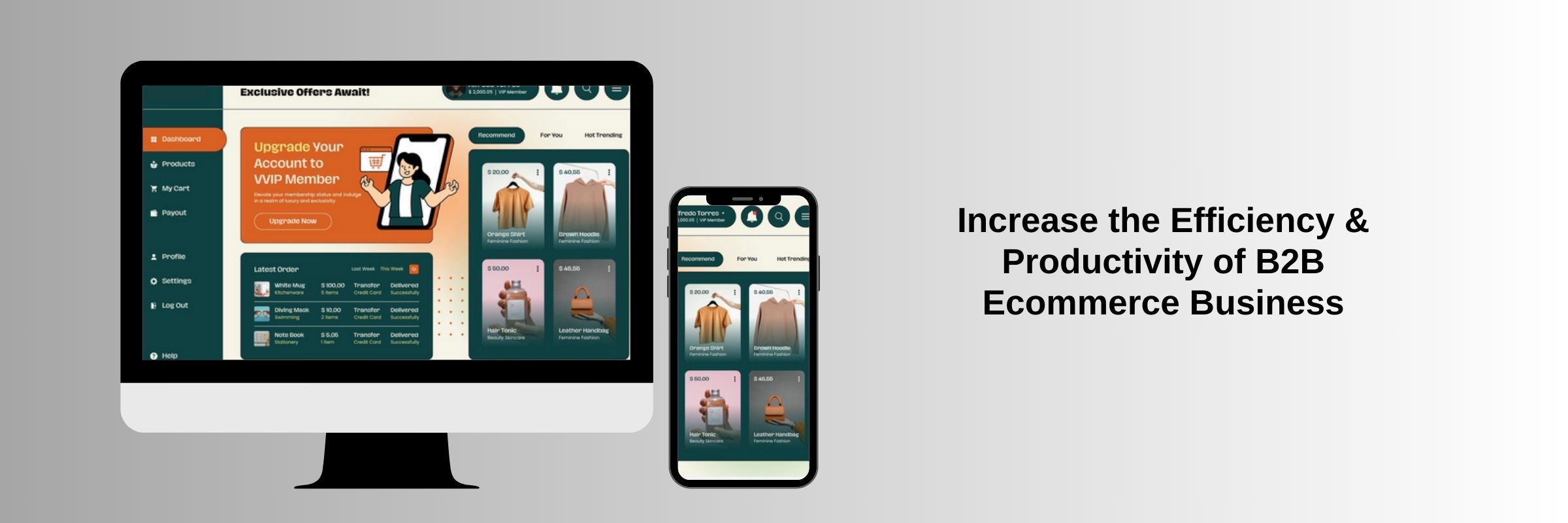
Top 10 Features Every B2B eCommerce App Must Have for Optimal Efficiency
Explore essential B2B eCommerce app features that boost sales, streamline processes, and future-proof your business with digital excellence.
- .

In the competitive world of B2B commerce, where every transaction and interaction counts, the right eCommerce app can be the game-changer that propels a business to new heights. Imagine navigating a bustling marketplace where efficiency isn’t just a goal but a necessity. In such a dynamic environment, having a feature-rich B2B eCommerce app isn’t just beneficial—it’s crucial.
But what truly sets apart a successful B2B eCommerce platform from the rest? What features can transform a standard app into an indispensable tool for business growth? With businesses increasingly relying on digital solutions for their operations, it’s vital to understand which features can streamline processes, enhance user experiences, and drive profitability.
In this blog, we will unravel the top 10 features every B2B eCommerce app must possess. These features are not just technical specifications but strategic assets designed to tackle common business challenges and maximize efficiency. Whether you’re looking to improve customer engagement, optimize bulk ordering, or ensure secure transactions, these insights will guide you in choosing or refining an eCommerce solution that truly meets your business needs.
10 Must-Have Features Every B2B eCommerce App Needs for Business Success
1. Custom Pricing and Discount Structures
Why It Matters: In B2B, one-size-fits-all pricing doesn’t work. Businesses often deal with multiple customer tiers—wholesalers, distributors, and retailers—each expecting pricing based on purchase history, volume, or contractual terms. According to a report by Forrester, 50% of B2B buyers expect personalized pricing based on their specific needs and order volumes.
Custom pricing and discount features allow businesses to set up tailored pricing models for different clients or customer groups.
Scenario: Imagine a large retailer that regularly places bulk orders. Custom pricing ensures that they receive discounts based on their purchasing patterns, fostering loyalty and increasing sales volume.
2. Advanced Search and Filtering Options
Why It Matters: B2B buyers are often short on time and need to quickly locate highly specific products from large catalogs. A weak search experience leads to frustration and cart abandonment. A study by Epsilon found that 77% of online shoppers consider the ability to search for products to be a key factor in their buying decisions.
Intelligent search improves product discoverability. Filters by SKU, specification, compliance, availability, and price help users find what they need without contacting support.
Scenario: A procurement manager needs to find a specific type of industrial component among thousands of products. Advanced filtering options streamline this process, saving time and reducing frustration.
3. User Role and Access Management
Why It Matters: Businesses often have multiple users with different roles and responsibilities. According to a Gartner survey, 70% of companies experience productivity losses due to poor access management.
With role-based permissions, companies can assign specific rights to users—such as viewing catalogs, placing orders, managing payments, or approving budgets—streamlining workflows and protecting sensitive data.
Scenario: A company with a large team of buyers and managers needs a system where each role has tailored access. This ensures that sensitive data is protected while streamlining workflow and approval processes.
4. Bulk Ordering and Quick Reordering
Why It Matters: Bulk ordering and quick reordering features are essential for businesses that frequently purchase large quantities of items. The Aberdeen Group reports that companies with streamlined reordering processes see 25% higher order accuracy.
Bulk and reorder features save time and increase order accuracy. Features like one-click reorder, order templates, and uploadable CSV files streamline large transactions.
Scenario: A manufacturer needs to reorder raw materials quickly. Bulk ordering features facilitate fast and accurate restocking, minimizing downtime and optimizing inventory management.
5. Integration with ERP and CRM Systems
Why It Matters: Integrating with ERP and CRM systems ensures seamless data flow across various business functions. According to a McKinsey report, companies that integrate their ERP systems experience a 20% increase in operational efficiency.
Real-time syncing between your app, ERP, and CRM allows automatic stock updates, order tracking, customer segmentation, and better decision-making.
Scenario: Synchronizing inventory levels with ERP systems ensures real-time updates, reducing the risk of overselling or stockouts and enhancing overall operational efficiency.
6. Multi-Currency and Multi-Language Support
Why It Matters: As businesses expand globally, multi-currency and multi-language support becomes crucial. Global buyers need local experiences. Supporting their native language and currency enhances trust and expands your market reach. A study by Deloitte reveals that 70% of businesses with international operations benefit from having a multi-currency eCommerce platform.
Customers can browse, shop, and transact in their preferred format. This feature is key for international distributors or partners.
Scenario: A European distributor needs to transact in multiple currencies and languages. This feature facilitates smooth transactions and improved customer satisfaction across diverse markets.
7. Personalized User Experience
Why It Matters: Personalization isn't just for B2C—B2B buyers also expect relevance. They want platforms to remember their preferences, purchase history, and recommend useful products. It enhances the user experience by tailoring content and recommendations. Personalized dashboards, recommendations, and promotions lead to better engagement and increased lifetime value. Research by HubSpot indicates that personalized content can increase engagement by 50%.
Scenario: A frequent buyer receives personalized product recommendations based on their purchase history. This not only improves their shopping experience but also drives additional sales.
8. Detailed Product Information and Specifications
Why It Matters: B2B buyers often need highly specific details—dimensions, compliance, warranty, compatibility—before placing an order. Providing comprehensive product details helps buyers make informed decisions. Thorough product content reduces errors, builds confidence, and minimizes returns. It also supports technical decision-making. A report by Product Research states that 90% of B2B buyers consider detailed product information crucial when making purchasing decisions.
Scenario: An engineer needs precise technical specifications to select the right equipment. Detailed product information reduces the risk of errors and ensures the correct selection.
9. Secure Payment and Transaction Processing
Why It Matters: High-value transactions require robust fraud prevention, secure gateways, and flexible payment methods. Security is paramount in financial transactions. A secure payment environment increases trust and encourages higher-value purchases. Support for NEFT, net terms, cards, and wallets adds convenience. According to the Global Payment Security report, 40% of businesses experienced payment fraud in the last year, highlighting the need for robust security measures.
Scenario: A company processes large transactions through the app. Secure payment gateways and fraud detection mechanisms ensure the safety of sensitive financial information.
10. Analytics and Reporting
Why It Matters: To scale successfully, businesses need real-time insights into inventory, customer behavior, and sales performance. Analytics and reporting tools provide valuable insights into sales performance, customer behaviour, and inventory levels. Analytics dashboards reveal bestsellers, identify drop-offs, and help in forecasting demand. Custom reports help different teams make informed decisions. The Business Intelligence Group found that 82% of businesses using analytics saw improved decision-making.
Scenario: A sales manager reviews monthly reports to assess performance and identify trends. Analytics tools offer actionable insights, enabling data-driven decisions and strategic planning.
Conclusion
A successful B2B eCommerce app is more than a platform—it’s a strategic asset that automates operations, enhances relationships, and empowers your team. Each of these ten features contributes to smoother workflows, better customer satisfaction, and scalable growth. Whether you’re looking to overhaul your app or fine-tune your existing one, focus on solutions that reduce friction, support customization, and future-proof your business.
Ready to elevate your B2B eCommerce experience? Explore how these features can transform your business operations and unlock new growth opportunities.








 05 Apr 2025
05 Apr 2025 8 mins to read
8 mins to read


